#sultan saladin
Explore tagged Tumblr posts
Text

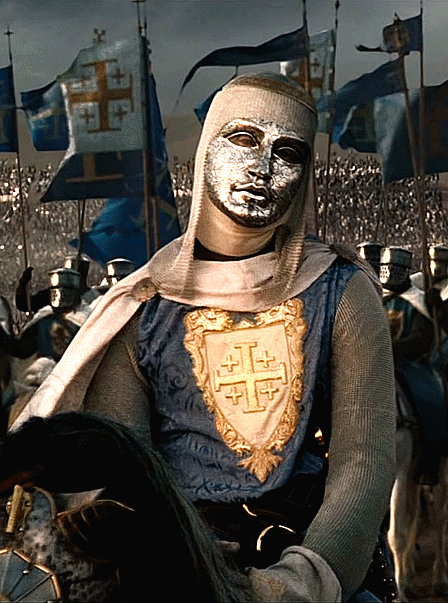

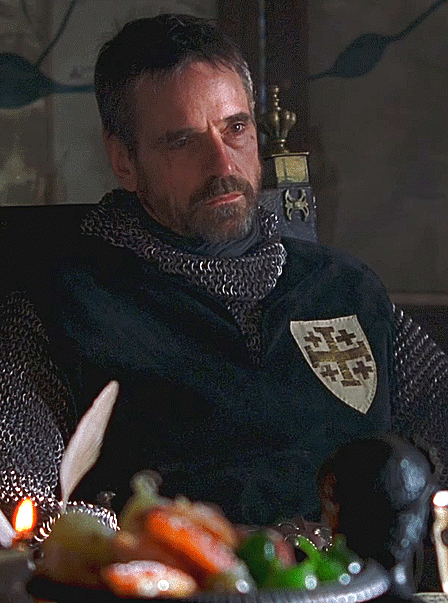
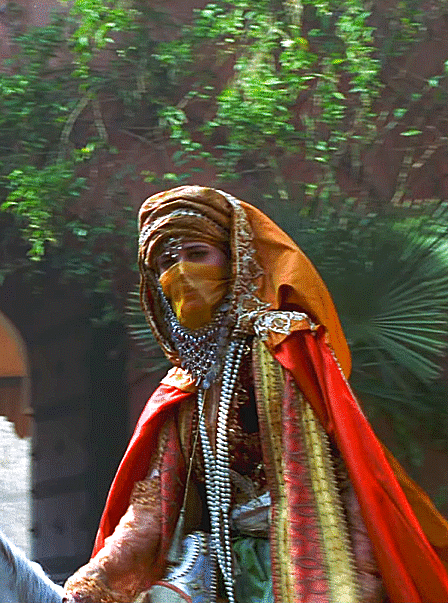
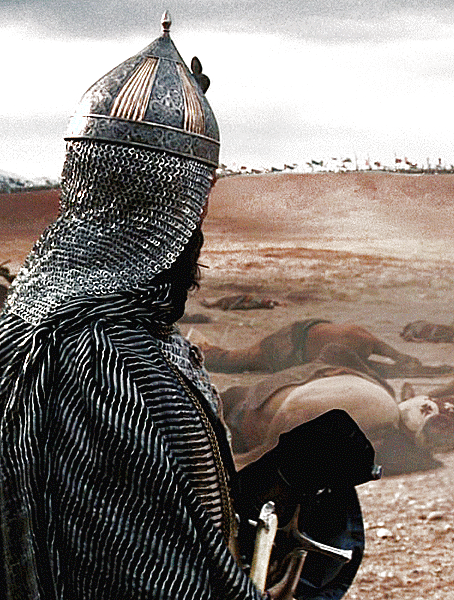

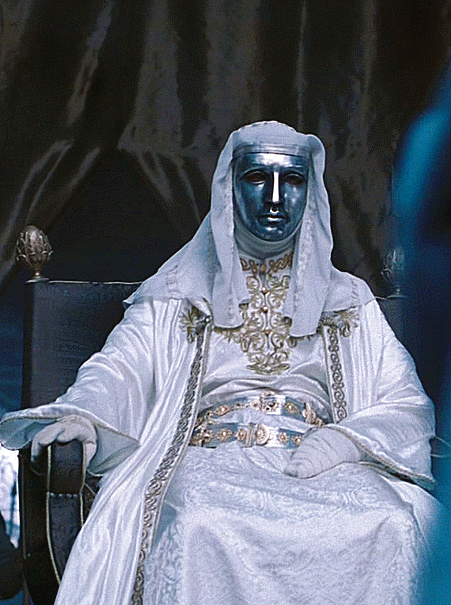
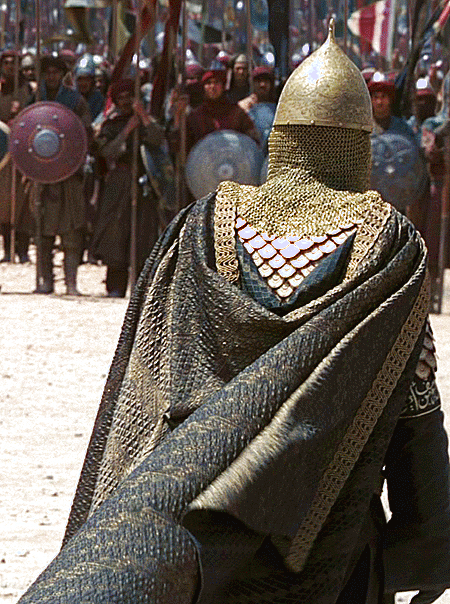
Perioddramaweek 2023
Day 3: Favorite Costumedesign
Kingdom of Heaven
#perioddramaweek2023#kingdom of heaven#perioddramaedit#period drama#costumes#eva green#sybilla#balduin iv#baldwin iv#edward norton#sultan saladin#ghassan massoud#imad ad din#alexander siddig#tiberias#raymond iii of tripoli#jeremy irons#armor#the costumes are awesome and so is the movie
1K notes
·
View notes
Text

My another KoH meme...
Saladin's plan:
1. "I conquer more and more areas to get them to my empire!"
2. "I invade Jerusalem with a lot of my millitary!"
3. (not in his plan) "I get my ass kicked by a leper brat with much smaller and weaker army..."
#my meme#my memes#meme#saladin#sultan saladin#baldwin iv#leper king#kingdom of heaven 2005#koh#koh memes#funny#śmieszne#gru meme
32 notes
·
View notes
Photo
[ID: Six gifs of Classic Doctor Who. The first gif shows Barbara Wright telling Sultan Saladin: "Well, I could say that I'm from another world. A world ruled by insects." The second gif shows her on the planet Vortis, watching horrified as two Zarbi are attacking one of the Menoptera. The third gif continues her speech: "And before that, we were in Rome in the time of Nero." The fourth gif shows Emperor Nero sliding a bracelet onto her arm. The fifth gif shows her ending her speech: "Before that, we were in England, far, far into the future." The sixth gif shows Barbara hiding from the Daleks along with Jenny Chaplin and Dortmun. End ID]






#Barbara Wright#dw#oooh nice!!#classic who#described#sultan saladin#nero claudius caesar augustus germanicus#jenny chaplin#Dortmun
2K notes
·
View notes
Text

Tomb of Ayyubid Sultan Saladin in Damascus, Syria
French vintage postcard
#ayyubid sultan saladin#sepia#damascus#photography#saladin#vintage#postkaart#ayyubid#ansichtskarte#ephemera#carte postale#postcard#postal#briefkaart#sultan#photo#tomb#syria#tarjeta#historic#french#postkarte
7 notes
·
View notes
Text

﷽
SULTAN SALAHUDDiN AL-AYYUBi (1137-1193), also known as Saladin or Yusuf ibn Ayyub, was the founder and first Sultan of the Ayyubid Dynasty that spanned from Egypt and Syria to Mecca and Medina. Most notably, he liberated Al-Quds, Palestine (Jerusalem) by defeating the Crusaders in 1187 (Palestine would remain free for over 700 years until it was invaded by Britain in 1917, leading to the creation of the State of Israel). He wielded a curved sword, made of the mysterious Damascus Steel, that is known to be one of the sharpest and most durable swords ever constructed. There were multiple assassination attempts on his life and none of them were successful. Salahuddin was renowned for his kindness, mercy, and generosity, even by his enemies. He spared the lives of the Christian dwellers of Al-Quds even though the Crusaders had slain the Muslims and the Jews. He kept giving his wealth away to the poor and needy, until there wasn’t even enough left to pay for his own funeral by the time he died. Salahuddin adhered strictly to Sunni Islam and was a follower of the Qadiri Sufi Order (Tariqah Qadiriyah), reciting its Awrad every day.
On his deathbed, someone asked him, “Oh Ayyubi, you are a great warrior of Islam. You have been fighting in the path of Allah for such a long time, but you weren’t martyred. You weren’t blessed with martyrdom,”
Salahuddin replied, “Throughout my life, I was yearning to be martyred in the path of Allah. But did you know that the sword of the enemy could not touch my neck?”
He continued, “In my childhood, my father took me to Sheikh Abdul Qadir Al-Jilani [descendant of Prophet Muhammad ﷺ, and founder of the Qadiri Sufi Order] and Sheikh Abdul Qadir Al-Jilani placed his hand on my neck. How could the sword of the enemy touch my neck when my neck was touched by the blessed hands of Sheikh Abdul Qadir Al-Jilani رَحِمَهُ ٱللَّٰهُ?”
Images: Filipa Figueiredo (left), Getty Images (right)
5 notes
·
View notes
Text


Tattooed his name with henna 😅 more or less
why does my hand look like a guy’s hand 😭
#saladin ayyubi#salah ad din yusuf ibn ayyub#kingdom of heaven#henna#sultan#Salahaddin#koh fandom#historical crush
8 notes
·
View notes
Photo

Children's Crusade
The so-called Children's Crusade of 1212 CE, was a popular, double religious movement led by a French youth, Stephen of Cloyes, and a German boy, Nicholas of Cologne, who gathered two armies of perhaps 20,000 children, adolescents, and adults with the hopelessly optimistic objective of bettering the failures of the professional Crusader armies and capturing Jerusalem for Christendom. Travelling across Europe, the would-be Crusaders perhaps reached Genoa but had no funds to pay for their passage to the Levant. While some participants simply returned home, a large number were sold into slavery, according to the legend. Whatever the exact events of the confused history of the 'Children's Crusade', the episode illustrates that there was a popular sympathy for the Crusade movement amongst the common people and it was not just nobles and knights who felt compelled to take the cross and defend Christians and their sacred places in the Holy Land during the Middle Ages.
Objective Jerusalem
Saladin, the Muslim Sultan of Egypt and Syria (r. 1174-1193 CE), had shocked the Christian world when he captured Jerusalem in 1187 CE. Despite the failure of the Third Crusade (1187-1192 CE) to then even get in touching distance of Jerusalem, and the even more dismal Fourth Crusade (1202-1204 CE), which had instead attacked Constantinople, there were still many Christians in the west eager to travel to the Holy Land and help in the task of retaking Jerusalem. There was perhaps, too, a frustration among the ordinary populace that despite the taxes they were asked to bear and the sacrifices in materials and supplies to repeatedly furnish Crusader armies, the primary objective of retaking the Holy City had still not been achieved. In 1212 CE a curious movement sprang up which has since gained legendary status. Thousands of children were organised into an 'army', and they set out for the Middle East thinking that they could do a whole lot better than the adults in defeating the Muslim infidels.
Continue reading...
142 notes
·
View notes
Text
Make way for Sultan Saladin!
(Please tap on the image for better quality)

‼️The outfit is NOT historically accurate‼️
***
There are also various options for you to choose from:




#Salah ad-Din Yusuf ibn Ayyub#salah ad-din#Saladin#Ghassan Massoud#salah ad din#art#beginner artist#kingdom of heaven#artwork#kingdom of heaven 2005#koh#kohfandom#koh fandom#kingdom of heaven fandom#baldwin#baldwin iv#king baldwin iv#king baldwin#artist on tumblr#small artist#artists on tumblr#digital drawing#digital art#illustration#digital illustration#my art#my artwork#ibispaint art#ibispaintdrawing#ibispaintx
177 notes
·
View notes
Note
Ok another request..
Saladin is coming back from a battle, absolutely tired, probably grumpy, the reader comes to cuddle him as he goes to bed hehehe (based on @somethingstrangeishere art hehehehe)
♡ My Comfort - Saladin x Reader ♡
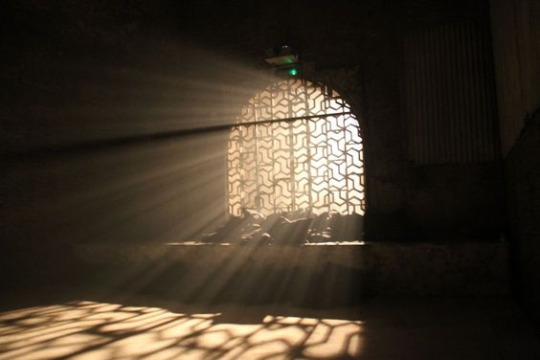
♡ Fluff ♡
A/N: Hey girl, this request is adorable omg I had to do it first. I have been dying to write this one since you sent it in 🩷😭. As always, this is based on the film Kingdom Of Heaven, not the real historical figures. Enjoy!
It was late afternoon when y/n received the news that her husband would be returning from battle that day. His army had been defeated by Jerusalem and word had already begun to spread around the kingdom.
From every corner of the castle, the young queen could hear servants whispering about the defeat. She knew how disappointed Saladin would be and the last thing he needed was to overhear some maid gossiping about his capability as sultan.
She along with the servants awaited their arrival outside the palace.
As one by one the men and their horses came into view, y/n anxiously scanned the crowd for her husband. Relief washed over her as she watched him dismount his horse, staggering a bit as he did.
The young queen ran to him, tears welling in her eyes at finally seeing him again. The moment he saw her, the sultan's heart relaxed for the first time in weeks as he fell into her arms.
They embraced for a long while as others bustled around, paying them no mind.
Saladin rested his forehead against his wife's shoulder, struggling to keep himself upright from exhaustion. Being back in her presence was what he had craved for the entire time he was gone.
“I'm so glad you're safe” y/n spoke softly, her voice barely above a whisper.
The sultan, being too tired to even speak, simply nodded in reply.
“Let's get you inside” she added, placing a hand on the small of her husband's back to guide him gently into the building.
-----------------------
Once inside the royal chambers, y/n ran a warm bath as Saladin sat down groggily on the edge of their shared bed, removing his dirty clothes slowly.
The queen helped him into the bath and began to wash his hair, gently massaging the tension from his aching temples. The sultan sighed as warm water washed over his face, a few times almost dozing off only to be jolted awake again by the sudden image of the horrors seen in battle.
Each time, his wife would soothe him, reassuring him that he was safe now and there was nothing to worry about.
Y/n helped her husband out of the bath, drying him gently with a soft towel. She ran the towel over his face, cupping his cheek in her hand.
“You're so beautiful, habibi” the young queen said, gazing into his eyes with only pure adoration in her heart.
Saladin smiled for the first time in what felt like months, his tired eyes looking into hers. He had missed her so deeply, he had yearned for her every second they were appart. The pain he felt from her absence resulted in only a few silent tears as he had stared blankly into a dying fire.
And now she was here, right in front of him. Finally.
Saladin was more than relieved to finally lay his aching body into the comfort of a warm bed. Y/n tucked him in before climbing into the bed herself.
She opened her arms, gesturing for him to cuddle against her chest. The sultan smiled wearily and eagerly accepted the offer. Y/n stroked his still slightly damp hair softly, running her fingers through his dark curls.
“You need not give up on yourself, my dear” the queen said gently.
“You are a brilliant and powerful sultan, I know how strong you are. Please do not allow this to defeat you” she paused to press a kiss to his forehead.
“I love you so much habibi, never forget that”.
Saladin shut his eyes tightly, fighting back tears at her lovely words.
“You always know just what to say” he whispered, y/n could hear his voice trembling. She smiled down at him as he buried himself against her chest.
Her heart ached for him.
Her powerful husband lying broken in her arms, stifling tears like a frightened child trying to appear strong.
“You do not need to be strong for me, my love. Allow yourself to let go of your pain” y/n whispered.
Almost as soon as the words left her lips, Saladin’s silent tears turned to broken sobs. The young queen held him as he cried, rocking him back and forth gently all the while stroking his hair.
A few minutes passed before the sultan’s sobs died down. It wasn't long before he was deeply asleep, worn out completely.
Y/n smiled at her husband's form. She missed the feeling of him laying beside her at night. The room felt so cold and quiet without him. She would never admit this out loud but he looked adorable when he slept.
Buried comfortably into the soft of his wifes nightdress, snoring a little with his lips parted. It was rare that y/n saw him at such peace.
Pretty soon, the young queen joined her husband in rest. Neither of the two left each other's embrace for the entire night.
#salah ad din yusuf ibn ayyub#salahuddin x reader#salahuddin kingdom of heaven#saladin#salahuddin ayub#saladin x wife reader#saladin x female reader#kingdom of heaven#kingdom of heaven 2005#kingdom of heaven fandom#koh fandom#koh#kingbaldwin#king baldwin iv#king baldwin#the leper king#leper king#baldwin iv#baldwin#baldwin iv of jerusalem#king baldwin x you#king baldwin iv x reader#king baldwin x reader#king baldwin iv x oc#yandre salahuddin#salahuddin#x reader#baldwin x reader#x yn
65 notes
·
View notes
Text
The Sultan, they said, was a good man. Soft, quickly moved to tears. Out of compassion, he bought the freedom of a Christian woman's stolen daughter. Even Walther von der Vogelweide, the minnesinger in distant Germany, praised the "mildness" of the powerful ruler in the Orient, whose name has a good reputation in the West: Saladin, a righteous man.
He was a man who always kept his word, even to his enemies.
He let his subjects drag him to court, because God's laws applied equally to everyone. Also for him, the ruler who managed to do what no one had ever managed before: to unite the Islamic world of the Middle East after centuries of discord and to wrest Jerusalem, the holy city of the Muslims, from the Christians in 1187.
His name translates as "righteousness of faith", and Saladin is indeed a devout Muslim. Nevertheless, after his conquest of the Holy Land, he allowed the Christians and Jews there to continue praying to their God. This is another reason why, more than half a millennium later, Western Enlightenment thinkers would make him the epitome of the tolerant ruler.
But this al-Malik an-Nasir Salah ad-Din Abu'l-Muzaffer Yusuf ibn Ayyub ibn Shadi, known as Saladin for short, also had other sides.
He could be treacherous, vile and mean. He did not shy away from murder. Nevertheless, this man fascinated his contemporaries. He became one of the most revered rulers of the Islamic world and the most important opponent of the Crusaders.
Saladin was born in 1138 in Tikrit (in present-day Iraq), the son of a Kurdish officer. During his political career, Saladin was the first to bring Egypt's army under his control.
Saladin, a Sunni, now founds two universities where theology is taught according to Sunni theology - a signal that he is on the side of the population. He also abolished a number of taxes that contradicted the Koran and the teachings of the Prophet.
Saladin's subsequent conquests shock the Christian world. By 1174, his power extended from North Africa to the southern tip of the Arabian Peninsula. In 1186, he ruled from the Nile to the Tigris.
At the height of his power, the Sultan even dreamed of taking the Holy War to Europe, conquering Rome - and putting the Pope in chains.
The Crusaders conquered Jerusalem in 1099 and held it until Saladin besieged it in 1187 and handed it over to the Ayyubid dynasty, a Muslim sultanate that ruled the Middle East at the beginning of the 12th century.
Saladin wanted to recapture the city, which had previously been ruled by Muslims.
For Muslims, Jerusalem is a place where important events in the life of Jesus and other important personalities took place. It is also the place where the Prophet Mohammed ascended to heaven according to the traditional interpretation of the Koran and other texts.
In Sunni Islam, Jerusalem is the third holiest city after Mecca and Medina. Muslims believe that Muhammad was brought to Jerusalem during his night journey (Isra and Mi'raj).
The name Jesus is mentioned twenty-five times in the Holy Qur'an, often in the form 'Isa ibn Maryam, which means "Jesus, son of Mary". In the Quran, he is given the unique title "Messiah" (al-masih in Arabic), which means "anointed one". He is considered one of many prophets from the lineage of the Prophet Ibrahim, or Abraham (peace be upon him). Many Muslim traditions regard it as an ideal example of spirituality. Unlike Christians, who generally believe in a triune God, Muslims believe that Jesus was a great prophet who was to lead mankind on the straight path of monotheism and obedience to God (Allah).
When Jerusalem also fell, two kings and an emperor set off for the Holy Land with their armies from 1189 onwards. One of the monarchs is King Richard I of England. Even before the armed pilgrimage, he had already earned himself an honourable name: "Lionheart."
Saladin lies in wait for the Christians in the forests of Arsuf near the Mediterranean coast. But King Richard of England had anticipated the attack; on 7 September 1191, his troops won a clear victory. Nevertheless, the Muslim army is still strong enough to block the road to Jerusalem.
Saladin's reconquest of Jerusalem in 1187 prompted Pope Gregory VIII to organize the Third Crusade. From 1189 to 1192, Saladin lost Acre and Jaffa and was defeated in the field at Arsūf. The Crusaders retreated to Europe without seizing Jerusalem, but Saladin's military reputation had been damaged. He died in 1193.
#learn about history#studyblr#religion#religious studies#crusaders#history#oriental#history of crusade#Saladin#king baldwin iv#kingdom of heaven#history of Jerusalem#Islam#christianity#history of Religion#teaching#books#booklr
106 notes
·
View notes
Text
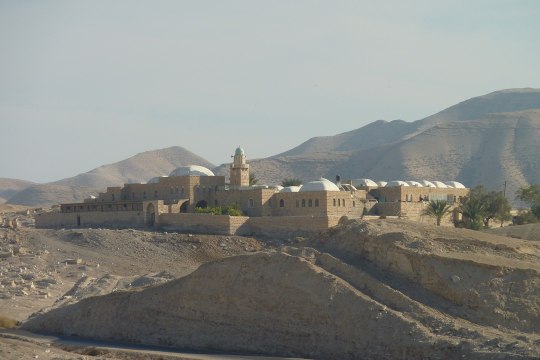
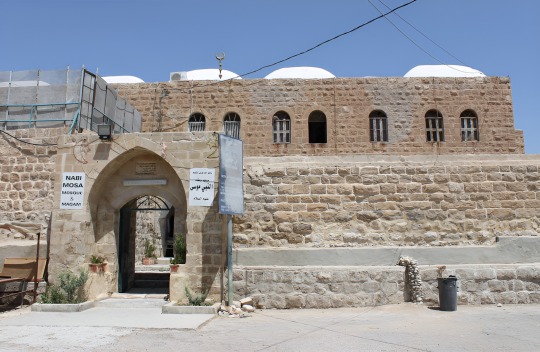
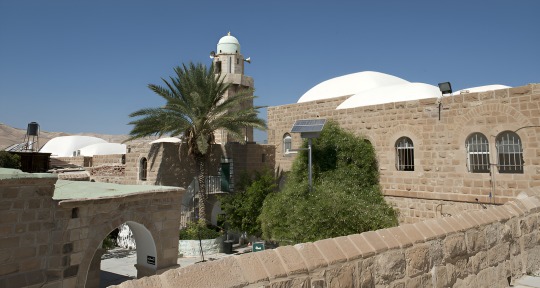

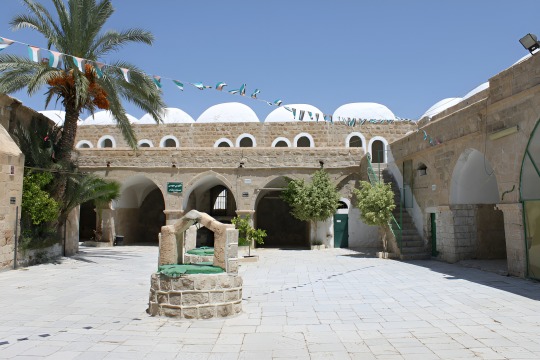

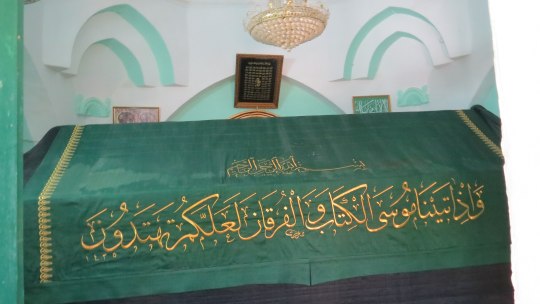
nabi musa (prophet moses) mosque/maqām in jericho governorate, palestine. local muslim tradition holds that moses was buried here. where exactly this tradition comes from is unknown.
every year, one friday before good friday in the greek orthodox calendar, a yearly pilgrimage from jerusalem to nabi yusha takes place, after which a festival in moses's honor is held. this began in the mid-19th century, though palestinian tradition holds that its origins lay in saladin's recapture of jerusalem from crusaders in 1187. this continues to hold symbolic importance today. the structure itself was likely built by mamluk sultan baybars eight decades later.
since the 1967 occupation, the pilgrimage was prohibited for 20 years (most likely due to association with the 1920 nabi musa riots) before being permitted again. since then, it's been prohibited on and off - most recently after the second intifada in 2000, before being renewed in 2007.
216 notes
·
View notes
Text
Congratulations to today's Champions!
Be it known that these Competitors have triumphed on the Third Day of Contest of Round Two!
Sir Lancelot [Santiago Cabrera] , BBC’s Merlin (2008-2012)

Defeats Sultan Alauddin Khilji [Ranveer Singh], Padmavaat (2018) with 56.9% of the Vote
Boromir, Son of Denethor [Sean Bean], The Lord of the Rings Trilogy (2001-2003)

Defeats Murtagh Morzansson [Garrett Hedlund], Eragon (2006) with 77.9% of the Vote
Arthur Pendragon [Bradley James], BBC’s Merlin (2008-2012)

Defeats Saladin [Milind Soman], Arn: The Knight Templar (2007) with 55.4% of the Vote
Adhemar, Count of Anjou [Rufus Sewell], A Knight's Tale (2001)

Defeats Ètienne de Navarre [Rutger Hauer], Ladyhawke (1985) with 54.9% of the Vote
Uhtred of Bebbanburg [Alexander Dreymon], The Last Kingdom (2015-2022)

Defeats "The Mute" [Jon Bernthal] Pilgrimage (2017) with 55.1% of the Vote
Turgut Alp [Cengiz Coşkun], Resurrection: Ertuğrul {Diriliş: Ertuğrul} (2014-2019)

Defeats Sihtric Kjartansson [Arnas Fedaravicius], The Last Kingdom (2015-2022) with 71.5% of the Vote
Prince Jingim [Remy Hii], Marco Polo (2014)

Defeats Sir Gary Galavant [Joshua Sasse], Galavant (2015-2016) with 53.4% of the Vote
33 notes
·
View notes
Note
HAIIIII GIRLL its maddy here, can you pls write saladin x reader where the reader helps him fall asleep after a long day? TYSMMM
Salahuddin X fem! Reader

Tags: fluff
Warnings: none
( this is about the Salahuddin from the movie "Kingdom of heaven" it has no relation to the real Muslim warrior)
@eatmeandbirthmeagain
☾☾☾☾☾☾☾☾☾☾☾☾☾☾☾☾☾☾☾☾☾
The sun hides and the Muslim camp is left in darkness, the only light source the fires that the men burnt.
The Sultan of the men, a handsome man in his late 40's, steps into his and his wife's shared tent.
It was a long and exhausting day, filled with training, meetings, and various other duties. As he reached the entrance of their tent, exhaustion and tiredness settling into every bone in his body, he pushed aside the flap and stepped inside.
Upon their bed rested the beautiful woman, her hair on the soft pillows, hands closely clothing a book. She had fallen asleep waiting for him again.
The Sultan hoping not to disturb his wife, removes his shoes and places them aside, then changes into comfortable wear. By the time he turns around she is sitting on the bed rubbing her eyes.
"You're back... I've missed you my dear... " the woman spoke, sleepyness still evident in her voice.
"Yes, I apologize if I woke you" responded the Sultan a rather bashful expression on his face.
The woman smiles and gets off the bed and straight into the man's arms.
"You can wake me anytime, no matter how beautiful the dream, seeing you will always be more beautiful" she spoke, a smile decorating her face.
The Sultan and his wife, hold each other for a moment, until she wipes her hand over his cheek, wanting to cup it, only to be met with dirt and sweat on it, from the day he had experienced.
"I see it has been a rough day my dear" Her eyes look up at him as she sees the exhausted expression on his face.
"You should bathe.. " she continues her voice almost a whisper.
The Sultan shakes his head. He was too tired.
"I will wash before the morning prayer... For now... I am too exhausted" he whispered back.
The woman allows her husband to lay in bed in his comfortable shirt and pants. As he lays there she brings a warm wet towel and sits in the bed besides him.
She gently undoes his turban, soothing some of the headache.
Sitting beside him, her legs on one side tucked neatly, she begins wiping the sweat and dirt with the warm towel. The Sultan let's out a breath that he did not know he was holding.
Laying his head in her lap, he begins drifting away as she washes his face with one hand and the other gently plays with his hair.
By the time the towel is down, he is in deep slumber, a small relaxed expression on his face.
She moves him gently and covers him. "I love you" she whispers and falls asleep in her spot.
When morning comes the Sultan awakesns to the sound of the fall to prayer. He looks to his side, she's there, laying, all warm and tucked in.
Before he gets up, he kisses her temple and whispers "I love you".
#kingdom of heaven#kingdom of heaven 2005#kingdom of heaven fandom#koh fandom#saladin x reader#koh salahuddin#lord saladin x reader#salah ad din x reader#salah ad din yusuf ibn ayyub#lord saladin
21 notes
·
View notes
Text
Days 1 - Tamir
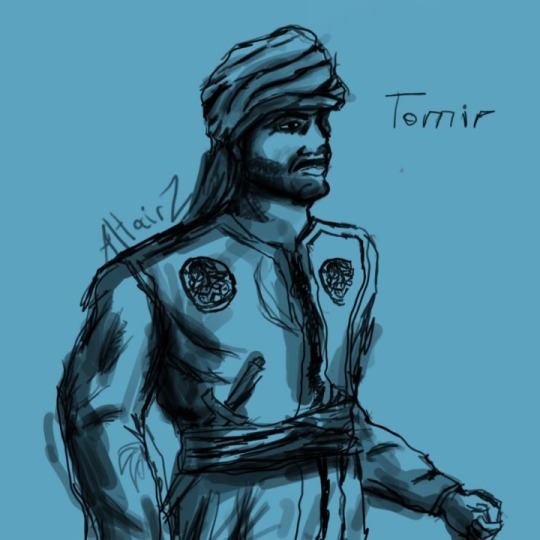
a Syrian arms dealer who ran the large Al-Silaah market in Damascus. One of nine important members of the Levantine Templars during the Third Crusade, responsible for the production and supply of the order's weapons.
At the height of his influence, he was believed to control the most extensive underground trading network in the Holy Land, having the power to purchase any item requested by his clients at exorbitant prices. He rose to prominence from the status of a humble caravan merchant, managing to win the favor of the Sultan of Egypt and Syria, Saladin, although Tamir himself resorted to insults and threats to his subordinates to carry out his plans. The merchant guild of Damascus was loyal to him, but only out of fear, as he often resorted to threats and public executions to force his employees to comply with his demands.
28 notes
·
View notes
Text
On the Cultural Afterlives of Salah ad-Din
"Within the broad historical legacy of relations between the people of the Near East and the West—one that in reality is far more complex than these binaries allow—the Sultan Saladin occupies a distinct position: a holy warrior dedicated to the recovery of Jerusalem for Islam, yet a figure to be respected in the West as well.
"Because of his capture of Jerusalem in 1187, Saladin is a hero to the people of Sunni Islam. This is logical enough, but for him to have acquired an attractive profile in the West is much less understandable. As the man who took Christendom’s holiest city he was, initially at least, an object of virulent fear and hatred, an evil harbinger of the apocalypse. Based on his personal qualities of piety, mercy, generosity and justice, the startling transformation from antipathy to admiration began within a few years of the fall of Jerusalem [...]. By the time of European settlement and the colonial era in North America, his image was set in generally positive terms; ideas and attitudes already formed within Europe had moved across the Atlantic. The crusading movement had largely declined by this point and the great Enlightenment thinker Voltaire was scathing in his assessment of it, regarding the crusades as a form of madness and the crusaders themselves as cruel and immoral. But his perception of Saladin, informed by the transformation noted above, meant that the sultan was ‘a good man, a hero and a philosopher’. [...] A plethora of other references in both historical works and popular literature reinforced the sultan’s reputation in all sorts of contemporary literature.
"[...] A romanticised view of Saladin and the crusades (and the medieval period in general) was given a huge boost [...] by the writings of Sir Walter Scott. His novels of the medieval age such as Ivanhoe (1819) and the crusade-focused The Talisman (1825) were enormously successful [...]. The chivalric world so brilliantly created by Scott, in which Saladin featured as a man of sophistication and integrity, certainly sunk deep into American culture. Mark Twain published his Innocents Abroad, or The New Pilgrims’ Progress, an account of his journey to the Mediterranean and the Holy Land, in 1869. The author wrote of the crusaders as chivalric warriors of the days of old, and after visiting the Holy Sepulchre Twain drew parallels between medieval times and the more recent Crimean War (1853–6). He also visited the site of the sultan’s great victory in the Battle of Hattin. Yet, in spite of Twain’s fierce hostility and disdain towards the Arabs and Turks, the ‘princely courtesy’ of the ‘peerless Saladin’ survived his scathing pen.
"[...] In broader popular culture, cinema brought Saladin to a far bigger audience. Cecil B. DeMille’s 1935 epic, The Crusades, blended a post–World War I wish to avoid conflict with a strong dose of Sir Walter Scott and major cultural stereotyping of the people of the Near East. [...] DeMille wrote that his aim was ‘to bring out Saracens that were not barbarians, but a highly cultivated people, and their great leader Saladin as perfect and gentle a knight as any in Christendom’.
"In 1955 the book The Talisman was openly pressed into service to make the film King Richard and the Crusaders. [...] [H]ere Saladin is an exotic figure drawn to Lady Edith, who hopes that love can cross the boundaries of religious war and that she can persuade the sultan of the virtues of Christianity. Saladin (played by Rex Harrison) is said to know the geography of a female like the palm of his hand, and so obvious is his allure to Edith that her Western admirer explodes in fury at ‘that silky son of Satan!’ The sultan is, inevitably, courteous enough to stand to one side and let his jealous rival escort Edith away. He is also, however, brave, wise and noble, characteristics that can survive the Orientalist caricature [...].
"While we frequently use the word ‘crusade’ in its secularised sense as a good cause, or else associate it with events from the distant medieval past, there is a manifest need to understand how its meaning has remained potent in the Near East and to be aware that in this context it is a much more loaded term. Woven in with this, Saladin has long held a prominent position in the Arab and Muslim worlds as the man who drew together the region and defeated Westerners. His status as an attractive character to emulate and to rally around adds considerable lustre to this. [B]ut [...] he was far from perfect, attracting hostility from some contemporaries for his dynastic empire building and his periodic conflicts with other Sunnis. In the way that past heroes of a Western society can be attacked for what we now consider unattractive attitudes or political failings, some in the modern world can criticise Saladin—notably, the Shi’ites, because he ended their caliphate in Cairo 1171. This important point aside, for the Sunnis, Saladin stands as symbol of success, as a figure both aspirational and inspiring. His centuries-long status as a hero and the fact that he became so admired by his Western enemies, opponents across linguistic and cultural boundaries, also stand out. [...] He stands as a cultural ‘given’, not simply to be used by dictators and in situations of conflict, but to stand as a positive reference point in everyday life."
- Jonathan Phillips, The Life and Legend of the Sultan Saladin. Yale University Press, 2019, pp. ix-xxiv
10 notes
·
View notes
Photo

Third Crusade
The Third Crusade (1189-1192 CE) was launched to retake Jerusalem after its fall to the Muslim leader Saladin in 1187 CE. The Crusade was led by three European monarchs, hence its other name of 'the Kings' Crusade'. The three leaders were: Frederick I Barbarossa, King of Germany and Holy Roman Emperor (r. 1152-1190 CE), Philip II of France (r. 1180-1223 CE) and Richard I 'the Lionhearted' of England (r. 1189-1199 CE). Despite this pedigree, the campaign was a failure, the Holy City never even being attacked. Along the way, there were some victories, notably the capture of Acre and the battle of Arsuf. Fizzling out with a whimper, the Crusade collapsed because, by the time they arrived at their objective, the western leaders found themselves without sufficient men or resources to resist the still intact armies of Saladin. Although a compromise was negotiated with access for pilgrims to Jerusalem permitted and a Christian foothold maintained in the Middle East, another attempt to take the Holy City would shortly be made the original objective of the Fourth Crusade of 1202-1204 CE.
The Fall of Jerusalem
The Second Crusade (1147-1149 CE) had effectively ended with the complete failure to take Damascus in Syria in 1148 CE. The various Muslim states in the Middle East then realised that the once-feared western knights could be defeated and the precarious existence of the Crusader-held territories, the Latin East, was starkly highlighted. All that was needed now was a unification of Muslim forces and this was provided by one of the greatest of all medieval rulers, Saladin, the Sultan of Egypt and Syria (r. 1174-1193 CE).
Saladin, the founder of the Ayyubid dynasty in Egypt, took control of Damascus in 1174 CE and Aleppo in 1183 CE. Saladin then shocked the world by defeating the army of the Kingdom of Jerusalem and its Latin allies at the Battle of Hattin in 1187 CE. Thus, Saladin was able to take control of such cities as Acre, Tiberias, Caesarea, Nazareth, Jaffa and even, the holiest of holies itself, Jerusalem. Remarkably lenient with his Christian captives compared to the butchery of the First Crusade (1095-1102 CE), after the recapture of Jerusalem almost a century earlier, Saladin accepted ransoms from those Latin Christians who could afford to buy their freedom and enslaved the rest. Eastern Christians were permitted to remain in Jerusalem as a protected minority group. The Latin East had all but collapsed, only Tyre remained in Christian hands, under the command of Conrad of Montferrat, but it would prove a useful foothold for the coming fightback.
Pope Gregory VIII only reigned for a few months in 1187 CE but, in October of that year, he made a lasting impact on history by calling for yet another crusade to win back Jerusalem and such lost holy relics as the True Cross. Nothing less than a repeat of the remarkable feat of the First Crusade would do. No fewer than three monarchs took up the Pope's challenge: the Holy Roman Emperor, Frederick I Barbarossa, king of Germany, Philip II of France and Richard I of England. With these being the three most powerful men in western Europe, the campaign promised much.
Continue reading...
77 notes
·
View notes